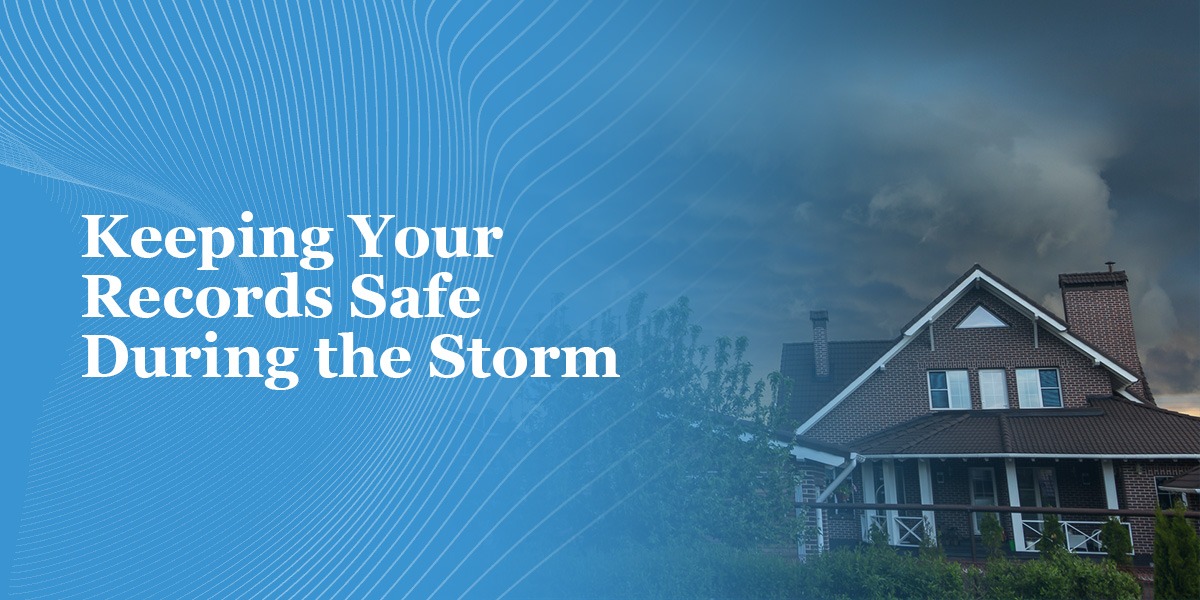
100+ Years of Combined Tax Resolution Experience.
100+ Years of Combined Tax Resolution Experience.
As we enter severe weather season, it’s important to keep you and your loved ones safe. Whether you are at your home or business, you should have an emergency plan ready and practice it often so you’re ready when disaster strikes. Along with keeping yourself safe, you should also take some time to make sure your records and your financial future are safe as well.
The IRS has released several tips that can help you keep important financial documents safe, along with helping prepare for rebuilding your life after the storm. There are simple things you can do beforehand that will help you not only secure your financial future after, but also help ease the burden of trying to rebuild.
Table of Contents
Important Documents to Keep Safe
There are several documents to have in an emergency and keep safe. After you ensure your basic needs are met in the event of a natural disaster, you should prioritize protecting your important financial and personal documents. Even better, take the steps now to protect your documents in case disaster strikes.
Here are some of the documents you should be keeping safe:
- Personal records: Some of the personal records you may need to keep safe include Social Security cards, birth certificates, driver’s licenses, citizenship papers, military IDs, adoption papers, child custody papers and records for your pets.
- Financial records: The financial records you keep safe should include your checking and savings account numbers, credit card, retirement and brokerage account information, list of stocks and bonds and your previous year’s tax returns.
- Medical information: Keep any medical information safe, such as your health insurance identification cards, prescription information, living will, powers of attorney and your physicians’ names with their contact information.
- Property records: If you own property, you’ll want to preserve the relevant records, such as a real estate deed of trust, the settlement document from your mortgage, pictures or video inventorying your possessions and registration and titles for your vehicles, RV or boat.
- Insurance policies: For your insurance policies, you should have the contact information for your providers and your policy numbers. Insurance policies may include your homeowners insurance, auto insurance, health insurance, life insurance, disability insurance, renter’s insurance and flood insurance.
- Estate planning documents: Save your estate planning documents like trusts, wills, powers of attorney, funeral instructions and your attorneys’ names with their contact information.
For further guidance on what information to keep safe, reach out to a tax attorney at Polston Tax.
Tips to Keep Your Documents Safe
Once you know which documents to preserve, it’s time to follow the tips below to keep your important documents safe in an emergency:
- Making electronic copies: One of the best things you can do is have electronic copies of all your tax and financial documents. Many financial institutions provide statements and documents electronically now, so this should be easier than it sounds.
- Storing important documents: For the important paper documents, you can scan them and store them electronically on a DVD or through iCloud storage. Keep electronic copies of key documents like your tax returns, banking statements and all your insurance policies. It’s best to keep these documents saved together so you don’t have to go looking for them later. Store physical information in fireproof, waterproof safes to protect them from potential damage.
- Documenting valuables: While you’re making copies of your documents, you should also note all of your important valuables. Take pictures of your home and all your belongings, especially items of high value. Documenting these items now will make it easier for you to claim insurance and tax benefits after disaster strikes. The IRS’s workbook, Publication 584, can help you compile a room-by-room list of all your belongings. Having photos of your belongings can help prove the fair market value of items for insurance and casualty loss claims.
- Requesting previously filed tax returns: If you need documents, you can request copies of previously filed tax returns and attachments from the IRS by filling out a Form 4506.
Get Help With Your Tax Documents From Polston Tax
At Polston Tax Resolution & Accounting, we can help you with your tax needs. We established our first office in 2001 in Norman, OK, and have since expanded to five offices throughout the nation to assist our clients. Our advanced tax services include negotiating various tax resolution options and tax and accounting help. We can create a custom strategy to give you the exact tax help you need.
Should you need assistance, Polston Tax is here to lend a hand. Check out our services and fill out our form for a free consultation. Or give us a call at 1-844-841-9857. We’re open 8 a.m. to 5 p.m. Central!
Additional Readings

We’re in an era in which more small businesses are launching like wildfire. Many people find starting a small business of their own as easy as a piece of cake. However, most of the time, what they fail to prioritize are some of the major players involved in smoothly operating their small business. A...

Do you know why most married taxpayers go for filing joint tax returns? It’s actually because of the benefits that it offers. But with joint tax returns, both the filers hold the responsibility for the tax bill or any penalties and interest that arise from it. Both are legally responsible for the entire liability, even...

What if you owe so much in taxes that you can’t see your way out of it? If you owe back taxes, you might not think there is a way you can ever pay things off. And the more those back taxes have accumulated, the deeper the hole. But that doesn’t mean you can’t dig...

Tax Audits are one of the most terrifying things a taxpayer can endure. Most taxpayers don’t know what being audited by the IRS entails and usually don’t know what to do if they are audited. IRS audits can be confusing to most taxpayers as most don’t know what the IRS is looking for when they...

Receiving a letter from the IRS can be intimidating, especially if you’re unsure what the notice is for or what to do next. Fortunately, many notices are nothing to worry about and are purely informative. Below, we look at everything you need to do — and what not to do — after getting a notice from the...

The Internal Revenue Service (IRS) is increasing audits on cannabis businesses — the agency is on a mission to ensure that cannabis businesses adhere to the tax code. Unfortunately, cannabis companies must comply with more strict tax laws than other businesses and can claim fewer deductions. Most business owners don’t realize this or aren’t able to meet the reporting responsibilities on their own. If you own a business in...


